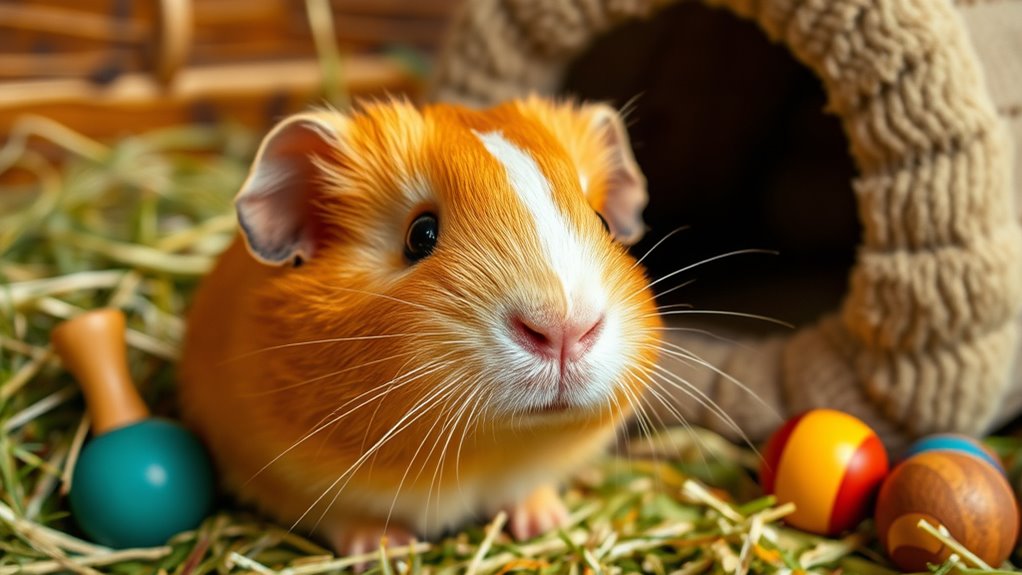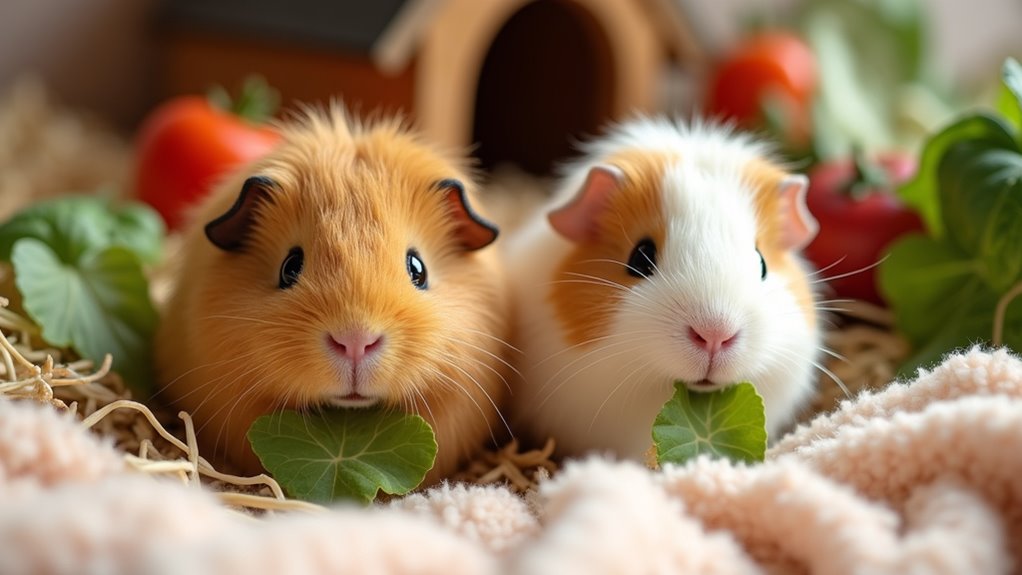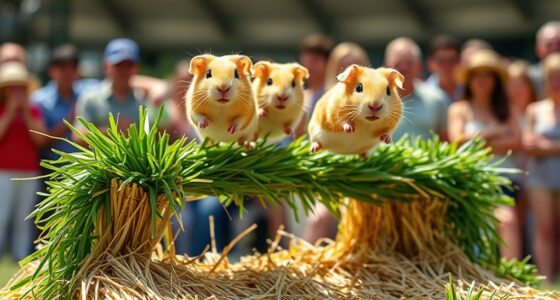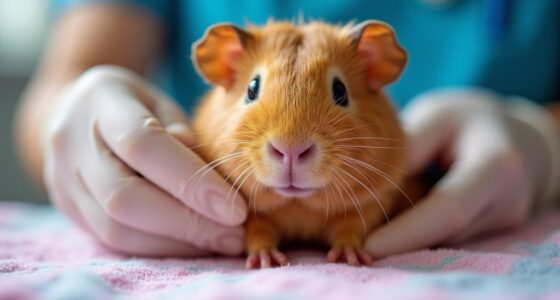To keep your guinea pig happy and healthy, provide a balanced diet with Timothy hay, fresh greens, and small fruits, avoiding processed foods. Regular grooming, especially for long-haired breeds, helps prevent mats and keeps them comfortable. Create a clean, enriched habitat with hiding spots and toys to stimulate their minds. Monitor their health closely, watch for signs of illness, and handle them gently to build trust. Want to learn more tips for a thriving cavy? Keep exploring!
Key Takeaways
- Provide a balanced diet with high-quality hay, fresh leafy greens, and vitamin C-rich vegetables to ensure health and happiness.
- Regular grooming, nail trimming, and skin checks prevent health issues and strengthen your bond.
- Create a clean, enriched habitat with hiding spots and toys to promote mental stimulation and comfort.
- Monitor eating habits, activity levels, and physical condition for early detection of illnesses.
- Handle your guinea pig gently daily to build trust and ensure a positive, stress-free care routine.

If you’re considering adding a guinea pig to your home, it’s important to understand their needs and behaviors. These small, social creatures thrive when their environment is properly managed, and knowing the essentials can make a significant difference in their happiness and health. One of the first things to focus on is their diet; guinea pigs require a balanced diet rich in vitamin C, fresh hay, and vegetables. Providing high-quality timothy hay should be your main food source, as it supports their digestive health and helps keep their teeth worn down naturally. Supplement their diet with fresh leafy greens like romaine lettuce, bell peppers, and small amounts of fruits occasionally. Avoid giving them iceberg lettuce or processed foods, as these can upset their stomachs or lack nutritional value. Fresh water must always be available, preferably in a clean water bottle to keep it fresh and free of debris. Incorporating enrichment toys can also promote mental stimulation and prevent boredom, which is important for their overall well-being.
Grooming basics are equally important to keep your guinea pig comfortable and healthy. Regular grooming helps prevent matting, reduces shedding, and allows you to check for any skin issues or parasites. Most guinea pigs have short hair that requires minimal grooming, but long-haired breeds need more frequent brushing—perhaps every day—to keep their coat tangle-free. When grooming, use a gentle, soft brush and be patient; your guinea pig may initially resist, but gentle handling builds trust. Besides brushing, routine nail trimming is essential, as overgrown nails can cause discomfort and even infections. Use small animal nail clippers and be careful not to cut into the quick, which can cause bleeding and pain. Additionally, check their ears, teeth, and skin regularly for signs of trouble, such as redness, swelling, or unusual discharge. Bathing isn’t typically necessary unless your guinea pig gets dirty; if needed, use a small animal-safe shampoo and ensure they’re thoroughly dried afterward.
Understanding your guinea pig’s grooming and dietary needs helps you create a nurturing environment where they can flourish. They are prey animals, so they naturally hide signs of illness—being attentive to their eating habits and physical condition is key. Offering a clean, enriching habitat with plenty of hiding spots will make them feel secure. When you combine a balanced diet with regular grooming, you’re not only maintaining their health but also strengthening your bond. Your guinea pig will become more comfortable around you, making daily care a positive experience. In the end, knowing the basics of diet tips and STEM toys can also enhance their environment and support their developmental needs, ensuring you’re providing a safe, happy life for your new furry friend.
Frequently Asked Questions
How Long Do Guinea Pigs Typically Live?
Guinea pigs typically live around 5 to 7 years, but with proper care, some reach up to 8 years. To guarantee a long, healthy life, focus on their guinea pig diet rich in hay, fresh veggies, and vitamin C. Regular guinea pig exercise helps prevent obesity and boosts overall health. Providing a balanced diet and encouraging activity can make a significant difference in your guinea pig’s lifespan.
Can Guinea Pigs Eat Human Snacks?
Imagine giving your guinea pig a piece of your snack, thinking it’s harmless. In reality, human snack dangers like high sugar and salt can harm your cavy. Guinea pigs shouldn’t eat human snacks, but healthy snack options like fresh veggies or fruits are perfect treats. Always prioritize their health, and stick to guinea pig-safe foods to keep your furry friend happy and healthy.
Are Guinea Pigs Suitable for Small Children?
You might wonder if guinea pigs are suitable for small children. Generally, they’re best for kids ages 5 and up, as younger children may struggle with gentle handling. When handling, teach your child to support the pig’s body and avoid sudden movements. Supervise interactions to prevent stress or injury. With proper supervision and gentle handling tips, guinea pigs can become friendly, low-maintenance pets that your child can enjoy safely.
How Often Should I Bathe My Guinea Pig?
You might wonder how often to bathe your guinea pig. Generally, bathing routines depend on your cavy’s needs, but most guinea pigs only need baths every few months. Overbathing can strip their skin of natural oils, so it’s best to keep bathing infrequent. Use gentle shampoo and guarantee thorough drying. Regular grooming routines, like brushing, help keep them clean and reduce the need for baths.
Do Guinea Pigs Require Vaccinations?
Think of your guinea pig’s health as a delicate garden—each vaccination is like a shield protecting it from unseen pests. Guinea pig vaccinations aren’t always necessary, but they can prevent serious diseases. Regular vet check-ups help maintain your cavy’s robustness. By staying proactive with guinea pig vaccinations, you’re nurturing a thriving, happy home for your furry friend, ensuring their health blossoms like a well-tended flower bed.
Conclusion
Now that you know the essentials for caring for your guinea pig, you’re ready to give it a happy, healthy life. But remember, these little creatures have surprises of their own—hidden needs and quirks that only come to light over time. Stay attentive, keep learning, and be prepared for moments you didn’t see coming. Your cavy’s well-being depends on your dedication, and the journey to truly understanding them is just beginning. Are you ready for the adventure?









